I feel like I am finally getting my life back. Might even go running today, if all goes well.
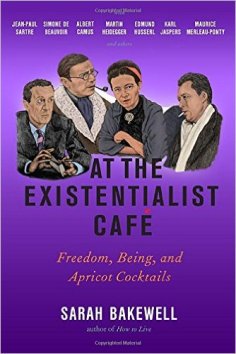 After fairly reading-deprived March, I now seem to be devouring books at a steady clip. I have belatedly dived into Sarah Bakewell’s At the Existentialist Cafe, which is very very good if you are looking for non-fiction. I find myself drawn to these types of ‘group biographies’, wherein a certain time period or theme is explored through lives of several people. In this case, philosophy and existentialism in particular are explored through lives of people who started the whole wonderful mess: Jean-Paul Sartre, Simone de Beauvoir, Karl Jaspers, and a whole host of others. Bakewell does a fantastic job connecting both philosophy and biography elements of the book, so the volume is both a great intro to existentialism and a fascinating look at some interesting lives.
After fairly reading-deprived March, I now seem to be devouring books at a steady clip. I have belatedly dived into Sarah Bakewell’s At the Existentialist Cafe, which is very very good if you are looking for non-fiction. I find myself drawn to these types of ‘group biographies’, wherein a certain time period or theme is explored through lives of several people. In this case, philosophy and existentialism in particular are explored through lives of people who started the whole wonderful mess: Jean-Paul Sartre, Simone de Beauvoir, Karl Jaspers, and a whole host of others. Bakewell does a fantastic job connecting both philosophy and biography elements of the book, so the volume is both a great intro to existentialism and a fascinating look at some interesting lives.
I also finished The Queue by Basma Abdel Aziz (translation by Elisabeth Jaquette). I have woefully enormous gaps when it comes to Middle Eastern literature, so this is filling some of those. The easy description of it would be 1984 mixed with Arab Spring. This is the kind of book reviewers would describe as ‘chilling’, I suppose. It is firmly in the ‘disturbingly true dystopia’ camp. Something called the Gate appears after a failed uprising. The Gate controls all of citizens’ lives, including their access to doctors and healthcare. One must submit applications to have life-saving surgery (which obviously means one does not get said surgery in time to save life). Mind you, the Gate is never open, and so the action takes place almost entirely in the queue that forms in front of it. It is a rather grim little book, but worth reading. Out May 24th.
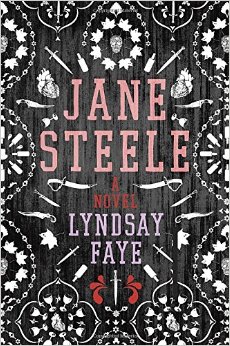 Afterwards, a couple of books were picked up and then abandoned after a handful of pages, and then I read a memoir that was fine until it used the ‘t’ word to refer to a certain type of bar. It seems that its author is one of those gay men who remain largely ignorant of the fact that certain terms are no longer kosher to use (see also John Barrowman’s usage of the same word a few months ago).
Afterwards, a couple of books were picked up and then abandoned after a handful of pages, and then I read a memoir that was fine until it used the ‘t’ word to refer to a certain type of bar. It seems that its author is one of those gay men who remain largely ignorant of the fact that certain terms are no longer kosher to use (see also John Barrowman’s usage of the same word a few months ago).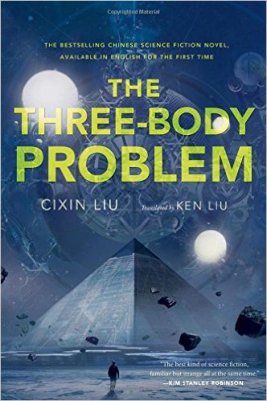 Other reads were on the speculative fiction side, the first one being Third Body Problem by Cixin Liu, translated by Ken Liu. It got a lot of buzz and love last year, but it happened during the time when I briefly fell out of love with hard sci-fi. Third Body Problem reads like science fiction from the Golden Age, eager to cram all of the science and ideas inside. It reads stilted, emotions plainly explained, all character motivations delineated, everything over-described. And therein lies my beef with Third Body Problem. It’s not that I need a pure ‘show don’t tell’ approach, but I need my science fiction to be more of a novel and less of a guidebook. I don’t think it’s translation. Perhaps this is just Cixin Liu’s style. Sadly, I will never know, Chinese being one of languages I am not going to master in this lifetime.
Other reads were on the speculative fiction side, the first one being Third Body Problem by Cixin Liu, translated by Ken Liu. It got a lot of buzz and love last year, but it happened during the time when I briefly fell out of love with hard sci-fi. Third Body Problem reads like science fiction from the Golden Age, eager to cram all of the science and ideas inside. It reads stilted, emotions plainly explained, all character motivations delineated, everything over-described. And therein lies my beef with Third Body Problem. It’s not that I need a pure ‘show don’t tell’ approach, but I need my science fiction to be more of a novel and less of a guidebook. I don’t think it’s translation. Perhaps this is just Cixin Liu’s style. Sadly, I will never know, Chinese being one of languages I am not going to master in this lifetime.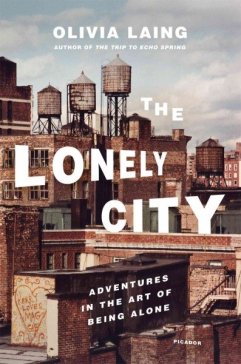 The Lonely City received
The Lonely City received 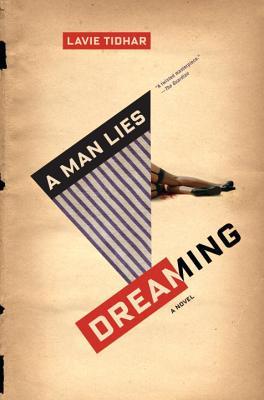 I could tell you that A Man Lies Dreaming by Lavie Tidhar is a pulpy and visceral alternate history noir revenge fantasy, but no blurb can adequately describe what this book is. You can’t talk about it without spoilers, and I pity the person who had to do the blurb on the inside cover. It is vague and it’s vague on purpose. A bitter private detective is living in a world where Hitler’s party is no more, Germany is taken over by Communists, and Nazis are fleeing to England. In another world and time, a man in Auschwitz is dreaming of the world where a bitter private detective is living in a world where Hitler’s party is no more, and Nazis are fleeing to England. With me so far? The man dreaming happens to be a former writer of shund, which in prewar Yiddish theatre was considered to be cheap melodrama, trashy and vulgar. And so the world he dreams of is narrated in the manner of shund, with all the viscerality and vulgarity that it implies.
I could tell you that A Man Lies Dreaming by Lavie Tidhar is a pulpy and visceral alternate history noir revenge fantasy, but no blurb can adequately describe what this book is. You can’t talk about it without spoilers, and I pity the person who had to do the blurb on the inside cover. It is vague and it’s vague on purpose. A bitter private detective is living in a world where Hitler’s party is no more, Germany is taken over by Communists, and Nazis are fleeing to England. In another world and time, a man in Auschwitz is dreaming of the world where a bitter private detective is living in a world where Hitler’s party is no more, and Nazis are fleeing to England. With me so far? The man dreaming happens to be a former writer of shund, which in prewar Yiddish theatre was considered to be cheap melodrama, trashy and vulgar. And so the world he dreams of is narrated in the manner of shund, with all the viscerality and vulgarity that it implies.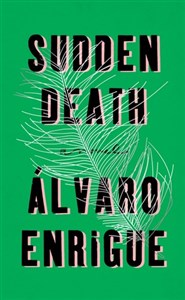 This might sound boring, except you get so caught up in Enrigue’s masterful blow-by-blow commentary that you are sucked into the book before you know it. Besides, consider that the tennis game in question is the game between Caravaggio and the Spanish poet Francisco de Quevedo. They are also doing it with a ball made with Anne Boleyn’s hair (shorn off her head before she lost it to the sword). But how did they come to possess such a thing and why are they playing at all? They both seem to be dreadfully hungover and not at all in the mood.
This might sound boring, except you get so caught up in Enrigue’s masterful blow-by-blow commentary that you are sucked into the book before you know it. Besides, consider that the tennis game in question is the game between Caravaggio and the Spanish poet Francisco de Quevedo. They are also doing it with a ball made with Anne Boleyn’s hair (shorn off her head before she lost it to the sword). But how did they come to possess such a thing and why are they playing at all? They both seem to be dreadfully hungover and not at all in the mood.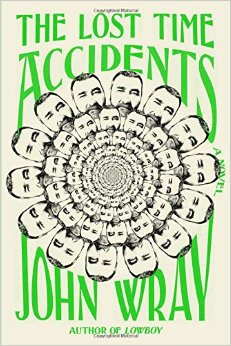 I started John Wray’s Lost Time Accidents a week or so ago and then realized I could only read it on days when I had stretches of uninterrupted time. It is a novel that I guess would be described as ‘literary genre’. In this case, it is a genre novel both because it is a historical novel and because it speculates on the nature of time. Charles Yu wrote
I started John Wray’s Lost Time Accidents a week or so ago and then realized I could only read it on days when I had stretches of uninterrupted time. It is a novel that I guess would be described as ‘literary genre’. In this case, it is a genre novel both because it is a historical novel and because it speculates on the nature of time. Charles Yu wrote 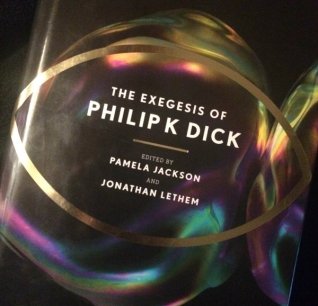 The first fifty pages (and to be honest, I feel the pattern will hold for the entirety of the volume) are an odd mix of borderline unhinged pronouncements (of the ‘I’m getting messages from aliens’ type) and simply examples of someone trying to figure out where thoughts, visions, and creativity come from, and trying to explain it in terms both neurophysiological and mystical. At least for me, the beginning of Exegesis is peculiar but not outrageously so. Perhaps it is because at one point I myself lived on a somewhat steady diet of mystical literature, from myth analyses to Jungian alchemical essays. Perhaps it is simply recognition that this is another human mind trying to figure out itself, though PKD’s take on it might be more peculiar than most.
The first fifty pages (and to be honest, I feel the pattern will hold for the entirety of the volume) are an odd mix of borderline unhinged pronouncements (of the ‘I’m getting messages from aliens’ type) and simply examples of someone trying to figure out where thoughts, visions, and creativity come from, and trying to explain it in terms both neurophysiological and mystical. At least for me, the beginning of Exegesis is peculiar but not outrageously so. Perhaps it is because at one point I myself lived on a somewhat steady diet of mystical literature, from myth analyses to Jungian alchemical essays. Perhaps it is simply recognition that this is another human mind trying to figure out itself, though PKD’s take on it might be more peculiar than most.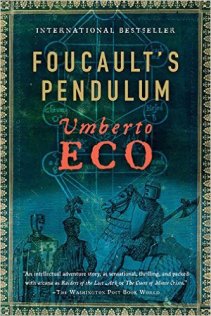 This week has been annoying to say the least, and now Umberto Eco died, so it is not ending on a high note either. What I would really like to do is to spend an entire day tomorrow re-reading Foucault’s Pendulum, the book with which I used to obsessed at one point in my life. Yet for some indescribable reason, I no longer have a copy, so I am going to settle for another example of strange historical fiction, John Wray’s Lost Time Accidents.
This week has been annoying to say the least, and now Umberto Eco died, so it is not ending on a high note either. What I would really like to do is to spend an entire day tomorrow re-reading Foucault’s Pendulum, the book with which I used to obsessed at one point in my life. Yet for some indescribable reason, I no longer have a copy, so I am going to settle for another example of strange historical fiction, John Wray’s Lost Time Accidents.